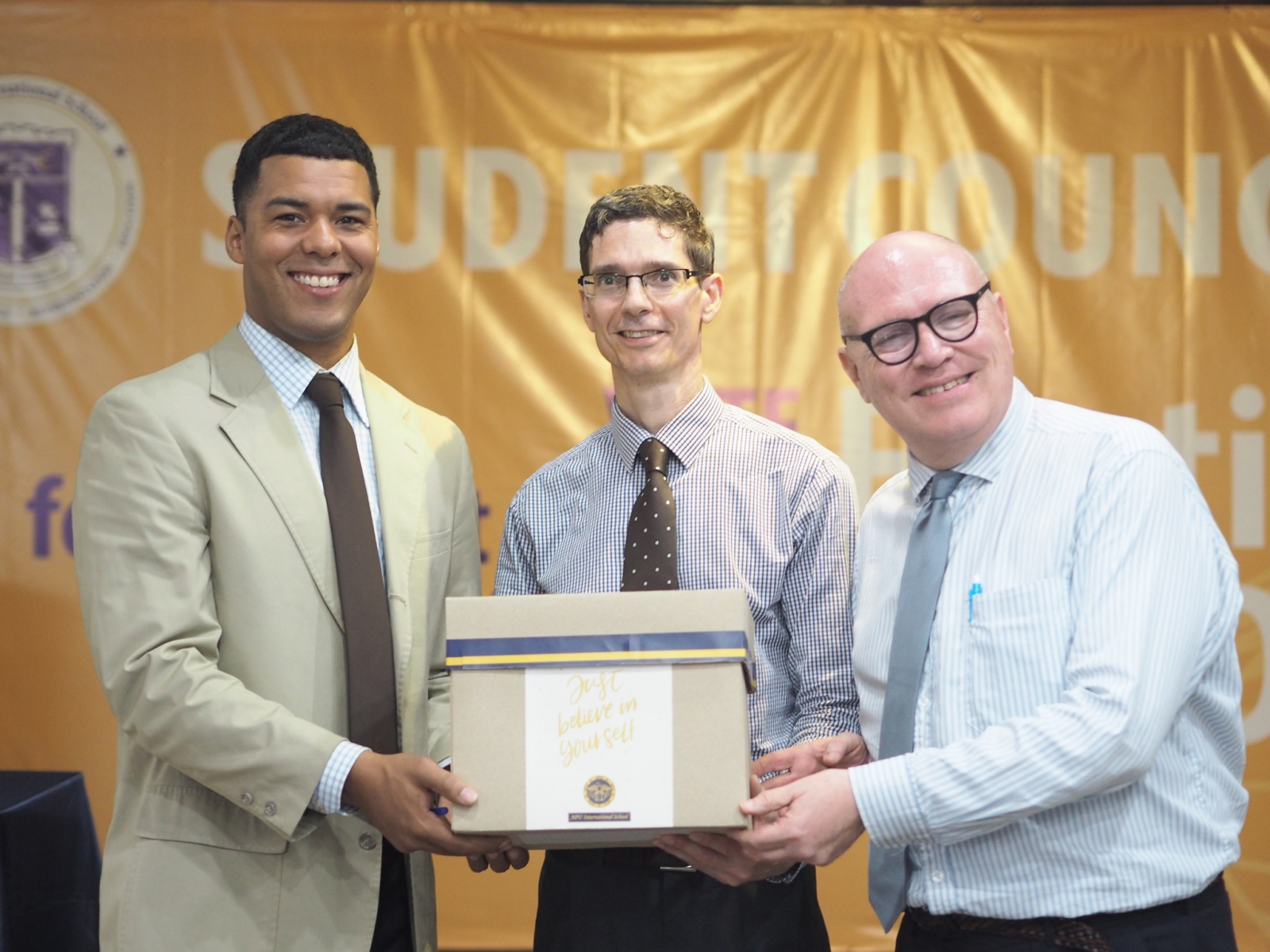Accreditation
Accreditation demonstrates APU’s commitment to excellence in education.
What is Accreditation?
Accreditation is a voluntary dual-purpose process that schools must be worthy of the trust placed in them to provide high-quality learning opportunities and clearly demonstrate continual self-improvement.
An accredited school is focused on a mission and goals for students; it is student-oriented and examines its students’ performance continuously; it accepts objective evaluation from a team of outside peer professionals; it maintains a qualified faculty within an effectively organized school; it collaboratively assesses the quality of its educational programs on a regular basis; and it plans for the future.
Why is accreditation important to our students
- Accreditation protects the interests of students, their parents, the academic institutions themselves, and potential employers, by ensuring that the educational programs offered have attained a level that meets or exceeds standards that were developed by experts in the field.
- Accreditation also plays a vital role in the ability to transfer credits from one school to another. You stand a better chance of previous college credits counting towards a new degree program if the former school was accredited. Accreditation may also affect whether or not you’re eligible for financial aid, along with what types of aid you may receive.
- APU American International School has received accreditation and membership certification from many leading international educational organizations. This reaffirms APU’s ongoing efforts and significant investment in improving training quality and APU’s international educational environment.
How to become an accredited school
- Becoming accredited is voluntary. However, any school that has concern for maintaining a student body and delivering a quality education will work toward receiving and keeping accreditation. The exact procedure will depend on which accrediting agency the school seeks accreditation from, but regardless of the agency, the entire process typically takes one to two years to complete.
- Accrediting bodies generally provide the standards and allow the institution to perform self-evaluations of their performance. The accreditors then perform an on-site, formal evaluation of the school and make a decision regarding its accreditation status. Accreditors continue to monitor regionally accredited institution during a set period of accreditation. When that period ends, schools get re-evaluated to renew their accreditation. This process ensures schools continue to adhere to high academic standards after initially earning accreditation.
COGNIA Accreditation
| COGNIA ACCREDITATION | |
| Cognia, formerly AdvancED, nationally recognizes districts that meet rigorous standards focused on productive learning environments, equitable resource allocation that meets the needs of learners, and effective leadership. Earning accreditation from the Cognia Global Accreditation Commission means that the school is accredited, and that APU is recognized across the globe as a school that meets Cognia Standards of Quality, and maintains a commitment to continuous improvement. | 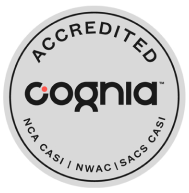 |
To earn Cognia accreditation, a school also must implement a continuous process of improvement, and submit to internal and external review. Schools in good standing can maintain their accreditation for a five-year term.
Dr. Mark A. Elgart, president and CEO of Cognia, stated, “Cognia Accreditation is a rigorous process that focuses the entire school and its community on the primary goal of preparing lifelong learners in engaging environments where all students can flourish. APU is to be commended for demonstrating that it has met high standards, is making progress on key indicators that impact student learning.”
Cognia Accreditation Divisions:
- North Central Association Commission on Accreditation and School Improvement (NCA CASI)
- Northwest Accreditation Commission (NWAC)
- Southern Association of Colleges and Schools Council on Accreditation and School Improvement (SACS CASI)
Other three US Accreditation Divisions:
- Accrediting Commission for Schools – Western Association of Schools and Colleges (WASC)
- Middle States Association of Colleges and Schools Commissions on Elementary and Secondary Schools (MSA)
- New England Association of Schools and Colleges (NEASC)
.png)
Council of International Schools CIS
A PRESTIGIOUS ORGANIZATION IN INTERNATIONAL EDUCATION ACCREDITATION
|
Council of International Schools (CIS) is a highly respected organization in the field of international education accreditation, with a rigorous set of standards to assess the credibility of international schools worldwide. Currently, CIS has over 1,400 educational institutions representing 122 countries around the globe as members. |
Council of International Schools (CIS) is a highly respected organization in the field of international education accreditation, with a rigorous set of standards to assess the credibility of international schools worldwide. Currently, CIS has over 1,400 educational institutions representing 122 countries around the globe as members.
The process of becoming a CIS member is rigorous and involves two stages. Firstly, CIS will evaluate the school's qualifications based on submitted information. Next, CIS will work with the school to assess its ability to implement the Council's standards for new member schools. To meet the criteria for CIS membership, a school must meet the following stringent requirements:
CIS conducts a rigorous evaluation process based on the CIS International Evaluation Framework, which includes 8 areas with 45 standards to cover most of the important activities of a school. Key areas that have been evaluated by multiple parties include:
- The school's educational philosophy
- The school's system of control and sustainable operating model
- Educational programs that meet the requirements of the 21st century
- High-quality academic standards
- A school environment that promotes the physical and mental health of students
- Facilities that meet international standards
- Collaboration between families and schools
- Human resources policies
In addition, member schools must demonstrate their commitment to their goals and objectives, including mission, vision, and core values; ensure the safety and happiness of the school community; provide high-quality teaching methods and programs; promote the development of global citizens; and comply with CIS Code of Ethics and the United Nations Convention on the Rights of the Child through school governance activities.
World School
|
World School is an organization specialized in evaluating and recommending international schools around the world. It has helped more than 500.000 parents and carers each year to make the best educational choices for their child. World School recognized institutions for those who are committed to delivering world-class learning experiences and innovative pedagogies to the aspiring leaders of the future. APU American International School was honored to be listed in the rankings of World Schools with impressive achievements:The Best American Schools in Asia, The Best International Schools in the World and Best Bilingual Schools around the world. |
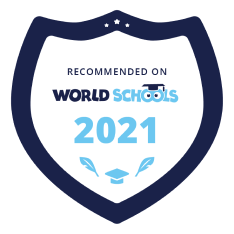 |
 |
 |
MAP Growth - NWEA
|
MAP Growth is the most trusted and innovative assessment for measuring achievement and growth in K–12 math, reading, language usage, and science. It provides teachers with accurate, and actionable evidence to help target instruction for each student or groups of students regardless of how far above or below they are from their grade level. It also connects to the largest set of instructional content providers, giving educators flexibility in curriculum choices. Using MAP Growth insights, teachers can confidently tailor instruction to challenge every student, whether they are below, at, or above grade level. MAP Growth student reports also present realistic learning goals by subject areas so that, |
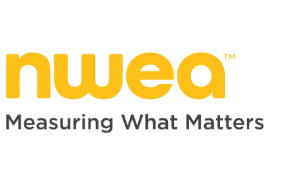 |
through a teacher’s guidance, students can individually see their progress and be inspired to take charge of their own learning.
MAP Growth is the signature test of NWEA. As known, NWEA is a research-based, not-for-profit organization that supports students and educators worldwide by creating assessment solutions that precisely measure growth and proficiency—and provide insights to help tailor instruction. For 40 years, NWEA has developed Pre-K–12 assessments and professional learning offerings to help advance all students along their optimal learning paths.
(1).jpg)
WIDA - A leading global network of schools focused on educating multilingual learners
|
The WIDA International School Consortium is a community of accredited, PreK-12 international schools that use WIDA's research-based standards and assessments. Member schools are committed to developing inclusive programs that build on the assets of all learners, while transforming the conversation about what multilingual students can do. The Consortium provides access to resources, research and reciprocal learning opportunities with other member schools. WIDA is housed in the Wisconsin Center for Education Research at the University of Wisconsin-Madison, one of the oldest, largest and most productive education research centers in the world. |
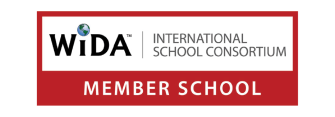 |
